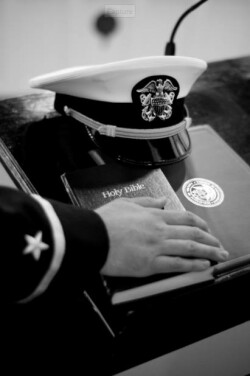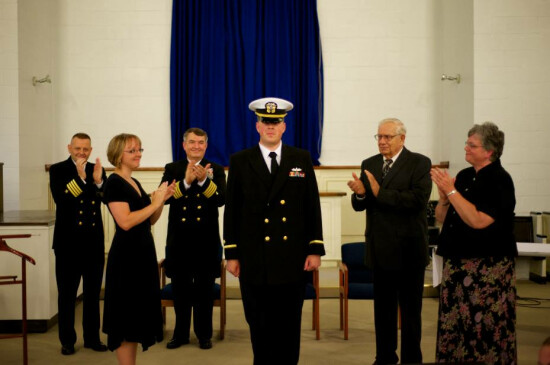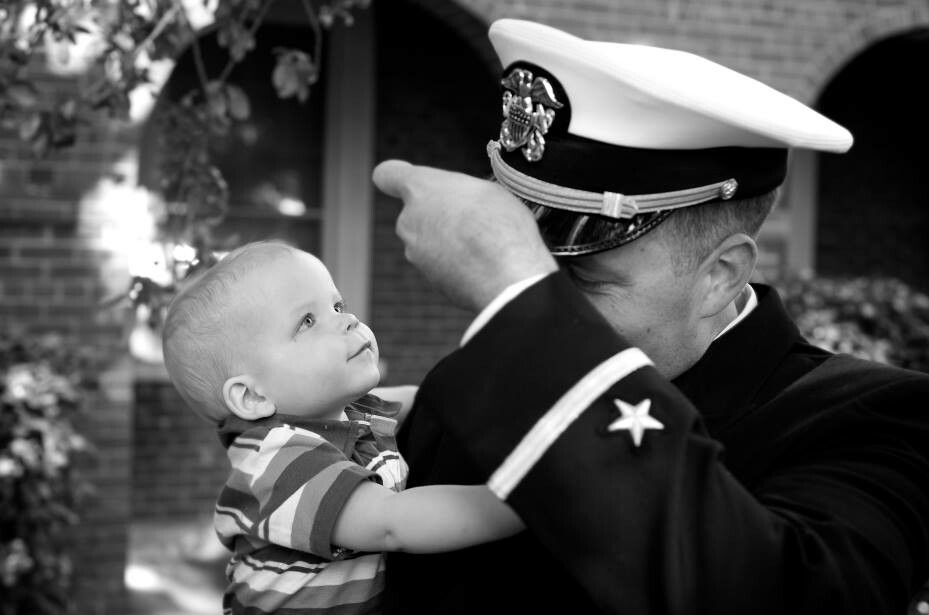Captain Steve Brown recently delivered a challenge at the military commissioning service of Navy Chaplain Candidate Justin Ellsworth, a student in the Master of Biblical Studies for Chaplaincy degree at VBTS. Read below Captain Brown's challenge to Justin - and all other military chaplains:
All US Military officers are required to recite this Oath as part of their initial commissioning ceremony and then at every promotion ceremony thereafter. This Oath is a succinct illustration of the Christian’s responsibilities to government and to God. Holding in His hand a Roman coin bearing Caesar’s image, the Lord Jesus summarized our responsibilities to government and to God when He said, Render therefore unto Caesar the things which are Caesar's; and unto God the things that are God's (Matthew 22:21b).
The Officer commissioning Oath is first a solemn Promise (I do solemnly swear). The officer is promising two things. First, to Bear Allegiance; this involves a loyalty to something bigger than self. The Officer’s solemn promise is to bear true faith and allegiance to the US Constitution, not to a person or even to the country. This is the Officer rendering therefore unto to Caesar the things that are Caesar’s. It is the Constitution that directs the course of the United States. The US Constitution speaks of securing the blessings of liberty, the unalienable Rights endowed by our Creator, as first enumerated in the Declaration of Independence.
The Constitution guarantees Christians liberty to practice their faith without harassment or discrimination. “Pluralism” is the outworking of that liberty and has historically meant respecting the right of others to believe and practice their religion, not necessarily respecting the content of their beliefs. For us, this means that we can freely exalt the name of Christ. The Gospel is inherently powerful and self-authenticating and will always efficaciously defend itself in the “Mars Hill” pluralistic philosophies of our day.
This Promise to Bear Allegiance is deliberate and voluntarily. The United States does not impress its officers. The aim of this promise to bear allegiance is Devotion to Duty, to well and faithfully discharge the duties of the office of chaplain. At the heart of this first promise is Honor. Someone without Honor cannot well and faithfully discharge their duties. They cannot keep this first promise.
Second, the Officer Promises to Bear Arms. This is implicit in the Oath’s promise to faithfully support and defend the Constitution. The Constitution, which directs and shapes the course of the country, has foreign and domestic enemies that the Officer must be willing to fight. This fight may require the ultimate sacrifice, one's life. This Promise to Bear Arms speaks of Courage. Serving as an Officer is not about a good paycheck, healthcare and educational benefits. Rather, it is about fully embracing the hardships, dangers, fears, separations, and even death that one's devotion to duty may require.
Although they are also officers, Chaplains are non-combatants and therefore do not bear arms. Their office, however, requires that they face the same dangers as the men and women they serve. The Chaplain’s ministry is especially crucial in hazardous duty zones, which may ultimately require one's last full measure of devotion. On August 30, 2010, Chaplain Dale Goetz (43) was killed in action with four other soldiers near Kandahar, Afghanistan. Dale died in a combat zone bringing the Gospel of Jesus Christ to his soldiers. Some things are worth dying for. As His Savior did for him, Dale laid down his life for those he loved and was called to serve.
Second, the Oath’s So help me God is a Prayer! This is Commitment. We can and should fulfill both  responsibilities, to government and to God. In this phrase, so help me God, both the officer and government have rightly invited God to view the commissioning ceremony. God observes with great interest the commitment made in this Oath.
responsibilities, to government and to God. In this phrase, so help me God, both the officer and government have rightly invited God to view the commissioning ceremony. God observes with great interest the commitment made in this Oath.
What are some of the implications of this phrase so help me God! It first speaks of submission. Ultimate loyalty (submission) lies here – to God. The Promise in the Prayer, so help me God, becomes a Covenant!
Next it speaks of sovereignty (and unto God the things that are God’s). The nation is admitting (though reluctantly today it seems) that God is superior/supreme to the nation, and has an interest in its affairs and the officers who run them. The Pharisees rightly admitted that Caesar’s image was on the Roman coin in Jesus’ hand. But in whose image was Caesar created? Governmental leaders are also responsible and accountable to God.
This phrase so help me God speaks of supplication. It is a prayer acknowledging that God’s help is needed in the commitment made in this Oath. The phrase speaks of sincerity. The military personnel and family members present are not the only witnesses to this Oath. The new officer is calling upon God to witness as well. There is a fervent solemnity in this commitment. The officer expects God to hold him accountable for the promises here made. The greatest motivation to do right is the fear of God, not the fear of man (government).
Upon the death of President Paul von Hindenburg on August 2, 1934, Adolph Hitler assumed supreme power as Fuhrer in Germany. To consolidate his power, he intentionally changed (to the chagrin of his officers) the German Wehrmacht Officer’s Oath, making every Military Officer “swear unconditional obedience to Adolf Hitler.” Millions would die as a result of this misdirected fanatical governmental allegiance.
The phrase at the end of our Oath, “so help me God” is mandatory, required by law in all Oaths of Office taken by US Military Officers and Enlisted Personnel. Asking God to witness the oath follows the pattern and form of ancient covenants, changing a promise into a covenant to act faithfully and loyally. It is quite chilling to hear that the US Air Force has begun to alter the Oath, no longer requiring this last phrase (See: Judicial Watch Sues DOD for Records about Removal of “So Help Me God” from Air Force Academy Written Materials).
Chaplains, your office is to represent your church/faith group faithfully to the military; there is no such thing as a generic chaplain. Be aware that our government has a tendency to try to create such a thing, but to do so officially is a violation of the Establishment Clause.
So, be who you are in Christ, and do not be ashamed of it! You have been commissioned an officer in the United States Military, but even more important than that, you have been called by God to serve Him and His body as a Christian Chaplain. Be who you are! The US Constitution allows, yea requires this, but even if it did not, God who is greater than the Constitution requires it. Whether God gives you three years or thirty years to serve as a Chaplain, rejoice in what He gives, and be faithful to Him in the years that He gives and the opportunities He provides.
The faithful, fervent, fleshed out promulgation of the Gospel of Jesus Christ is exactly what the men and women we serve still need. Render therefore unto Caesar the things that are Caesar’s and unto God the things that are God’s. So help me God!

